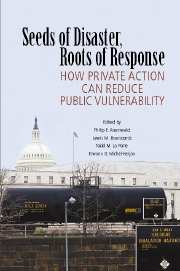Book contents
- Frontmatter
- Contents
- List of Contributors
- Foreword, by General Robert T. Marsh
- Preface
- Acknowledgments
- I SEEDS OF DISASTER
- II A CRITICAL CHALLENGE
- III MANAGING ORGANIZATIONS
- IV SECURING NETWORKS
- 11 Complexity and Interdependence: The Unmanaged Challenge
- 12 Managing Reliability in Electric Power Companies
- 13 Coordinated and Uncoordinated Crisis Responses by the Electric Industry
- 14 Electricity: Protecting Essential Services
- 15 A Cyber Threat to National Security?
- 16 Interdependent Security in Interconnected Networks
- V CREATING MARKETS
- VI BUILDING TRUST
- VII ROOTS OF RESPONSE
- References
- Contributors
- Author Index
- Subject Index
16 - Interdependent Security in Interconnected Networks
Published online by Cambridge University Press: 30 July 2009
- Frontmatter
- Contents
- List of Contributors
- Foreword, by General Robert T. Marsh
- Preface
- Acknowledgments
- I SEEDS OF DISASTER
- II A CRITICAL CHALLENGE
- III MANAGING ORGANIZATIONS
- IV SECURING NETWORKS
- 11 Complexity and Interdependence: The Unmanaged Challenge
- 12 Managing Reliability in Electric Power Companies
- 13 Coordinated and Uncoordinated Crisis Responses by the Electric Industry
- 14 Electricity: Protecting Essential Services
- 15 A Cyber Threat to National Security?
- 16 Interdependent Security in Interconnected Networks
- V CREATING MARKETS
- VI BUILDING TRUST
- VII ROOTS OF RESPONSE
- References
- Contributors
- Author Index
- Subject Index
Summary
In an interdependent world, the risks faced by any individual, firm, region, or country depend not only on its own choices but also on those of others. In the context of terrorism, the risks faced by any airline, for example, are tied to the security standards of other carriers and airports.
To illustrate this point, consider the destruction of Pan Am flight 103 in 1988. In Malta, terrorists checked a bag containing a bomb on Malta Airlines, which had minimal security procedures. The bag was transferred in Frankfurt to a Pan Am feeder line and then loaded onto Pan Am 103 in London's Heathrow Airport. The transferred piece of luggage was not inspected at either Frankfurt or London – the assumption in each subsequent airport being that baggage had been inspected at the point of origin. The bomb had been designed to explode above 28,000 feet, a height normally attained only on the transatlantic route. The bomb exploded over Lockerbie, Scotland, killing 259 passengers and crew, and another 11 people on the ground. Failures in a peripheral part of the airline network, Malta, compromised the security of a flight leaving from a core hub, London.
A great deal of work on the vulnerability of critical infrastructures to terrorist attacks is described elsewhere in this book. These other chapters focus on individual firms or systems, such as the electric grid, telecommunications services, and the cyber network, and ask how much their security depends on the actions of others due to the transmission of harmful effects from one agent to another (which from now on we refer to as contamination).
Information
- Type
- Chapter
- Information
- Seeds of Disaster, Roots of ResponseHow Private Action Can Reduce Public Vulnerability, pp. 258 - 276Publisher: Cambridge University PressPrint publication year: 2006
Accessibility standard: Unknown
- 10
- Cited by
